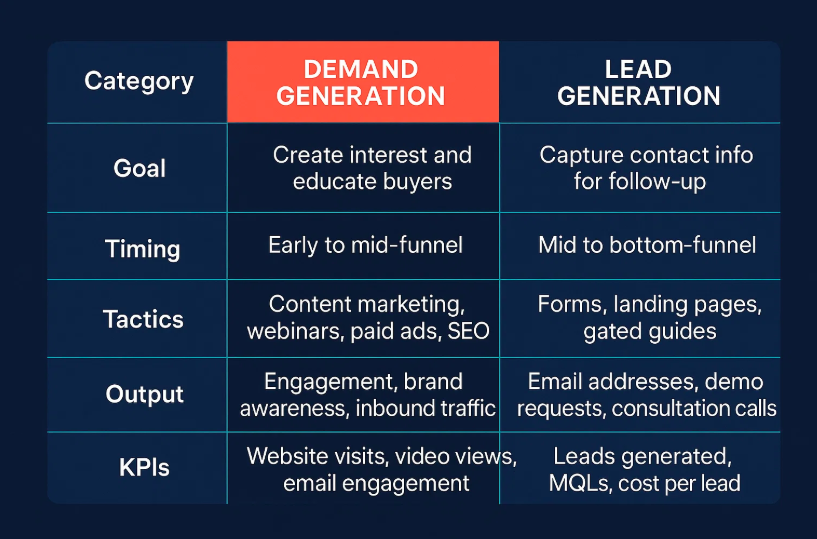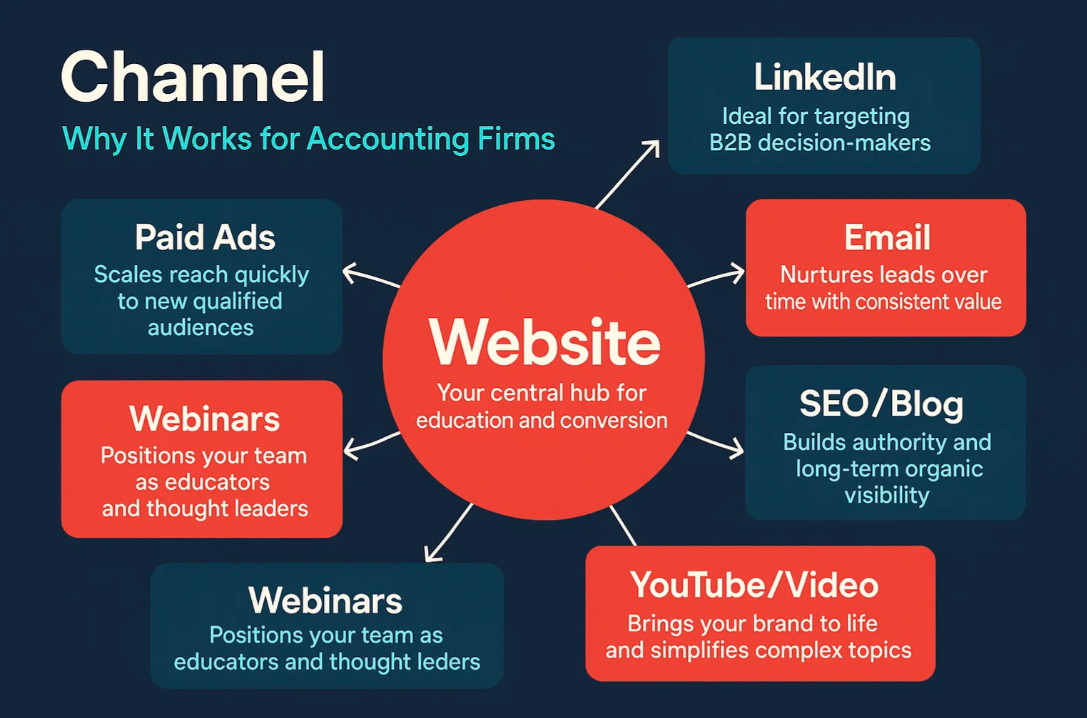The accounting industry has changed. Firm growth no longer depends solely on referrals and word of mouth. Today’s most successful accounting firms are using modern marketing to attract the right prospects and move them through a thoughtful, intentional buyer journey. At the heart of that strategy is demand generation.
If your firm is focused on growing its client base, launching new services, or scaling revenue without relying on seasonal spikes, demand generation in the accounting industry needs to be a priority.
In this in-depth guide, we’ll explain demand generation, how it differs from lead generation, the core strategies that power it, and how accounting firms can create a full-funnel engine that delivers results.
Contents
- 1 What Is Demand Generation?
- 2 Why Demand Generation Matters in the Accounting Industry
- 3 The Demand Gen Framework for Accounting Firms
- 4 Demand Generation Channels for Accounting Firms
- 5 Measuring Success: KPIs for Demand Generation
- 6 Common Mistakes to Avoid
- 7 Real-World Example: Building a Demand Engine in Practice
- 8 Let’s Build Your Demand Engine
What Is Demand Generation?
Demand generation is a long-term, strategic approach to creating awareness, interest, and desire for your accounting firm’s services. It covers every touchpoint from a prospect’s first interaction with your brand to the moment they’re ready to speak with your team.
It’s not just about capturing leads. It’s about creating demand among your ideal prospects – even before they’re actively looking for an accountant or CPA.
Demand Gen vs. Lead Gen: What’s the Difference?
Many firms confuse demand generation with lead generation, but they’re not the same thing.

Both are important, but demand generation sets the stage. It ensures that when prospects are ready to buy, they already know and trust your firm.
Why Demand Generation Matters in the Accounting Industry
Accounting services are rarely bought on impulse. Business owners and CFOs need time to research, evaluate, and trust a firm before committing. This buying journey often spans weeks or months, and demand generation helps you stay top of mind throughout that process.
Without demand generation, you’re relying on short-term tactics like cold outreach or seasonal campaigns. While those can generate leads, they don’t build brand equity or a long-term pipeline. In contrast, demand gen:
- Educates your audience before they need you
- Positions your firm as an authority in your niche
- Builds trust and credibility early in the buyer journey
- Increases lead quality and shortens the sales cycle
The Demand Gen Framework for Accounting Firms
Building a successful demand generation strategy means addressing every stage of the buyer’s journey – from unaware to consideration to conversion. Here’s how accounting firms can do it:
Stage 1: Create Awareness
At the top of the funnel, your goal is to get your firm in front of the right audience, even if they aren’t actively searching for accounting services yet.
4 Tactics That Work:
- Content Marketing
Write blog posts and guides around common pain points like:
- “How to reduce tax liability for real estate firms”
- “Cash flow strategies for construction businesses”
- “What your current bookkeeper isn’t telling you”
- Paid Social Advertising
Platforms like LinkedIn allow you to target CFOs, business owners, and finance directors by industry, location, and company size. Use content-based ads that promote helpful resources, not just services.
- SEO (Search Engine Optimization)
Optimize your website and blog content for terms related to your ICP’s problems. Focus on both high-intent and informational keywords like:
- “outsourced accounting for nonprofits”
- “quarterly tax planning strategies”
- “what to look for in a virtual CFO”
- Webinars and Virtual Events
Host monthly or quarterly webinars on hot topics – not sales pitches. For example:
- “5 Common Mistakes in Year-End Tax Planning”
- “Scaling Your Startup Finance Stack: What Founders Should Know”
Pro tip: Offer a replay to capture demand even after the event ends.
Stage 2: Build Engagement
Once your prospects know who you are, the next step is to build interest and keep them engaged. This is where your firm can truly differentiate.
4 Key Strategies:
- Email Nurturing
Create sequences that educate and build trust over time. After someone downloads a tax checklist or attends a webinar, they should receive a drip campaign such as:
- Week 1: “5 Hidden Tax Deductions Your Firm Might Be Missing”
- Week 2: “Client Case Study: How We Saved a Law Firm $40K in Q1”
- Week 3: “Let’s Look at Your Books Together – Here’s How a Quick Review Works”
- Retargeting Ads
Use paid ads to stay visible to website visitors who didn’t convert. These can offer a second chance to download content, read a blog, or book a free consultation.
- Social Proof
Share testimonials, case studies, and success stories from current clients. When paired with educational content, this builds authority and trust.
- Interactive Tools
Develop calculators or assessments, such as:
- “What’s Your Financial Health Score?”
- “Do You Need a Fractional CFO? Take the Quiz”
These keep your audience involved and generate qualified leads who have shown buying intent.
Stage 3: Convert Demand into Leads
Once demand has been generated and nurtured, you now shift toward capturing interest with clear, conversion-driven tactics.
Conversion-Ready Offers:
- Free tax strategy consultation
- Bookkeeping audit
- Download: 12-Month Financial Planning Calendar
- Personalized proposal form
Use short, clear CTAs across your site, email, and social content. Make it easy for prospects to take the next step.
Best Practices:
- Keep forms short – only ask for what you need
- Use smart CTAs that speak to their situation (“Let’s clean up your books before Q4”)
- Offer online scheduling tools like Calendly so prospects can book on their own terms
Demand Generation Channels for Accounting Firms
You don’t need to be everywhere. Choose the channels where your audience spends time and where your firm can consistently deliver value.
Top Demand Gen Channels:

Measuring Success: KPIs for Demand Generation
Your accounting firm’s demand generation strategy should be measurable. Here’s what to track:
- Website traffic growth (especially organic)
- Content engagement (video views, blog time-on-page)
- Lead magnet downloads
- Webinar registrations and attendance
- Email open and click-through rates
- Retargeting ad performance
- Number of MQLs (marketing qualified leads)
- Conversion rate from MQL to booked consultation
Over time, the real indicator of success is pipeline growth—the number of leads that move into sales conversations and proposals.
Common Mistakes to Avoid
Even well-intentioned demand generation efforts can fall short if key elements are missing.
Watch Out For:
- Too much focus on services: Talk about the client’s problems, not just your offerings
- No lead nurturing: Not every visitor is ready to talk today – stay top of mind
- Inconsistent publishing: If you post a blog once a quarter, you’re invisible most of the year
- Lack of alignment between marketing and sales: Ensure everyone agrees on what qualifies as a good lead
- Ignoring analytics: If you’re not tracking engagement, you can’t improve results
Real-World Example: Building a Demand Engine in Practice
One mid-sized accounting firm focused on tech startups invested in a full-funnel demand generation program. Here’s how they did it:
- Created a monthly webinar series on financial modeling and funding readiness
- Launched a content hub with guides like “Startup Tax Planning 101”
- Ran LinkedIn ads targeting Series A founders and CFOs
- Added smart CTAs across their blog and landing pages
- Used HubSpot to build nurture sequences for each industry vertical
Results over six months:
- 3,400 new website visitors per month
- 800+ webinar registrations
- 270 MQLs
- 75 discovery calls booked
- $850K in qualified pipeline opportunities
Let’s Build Your Demand Engine
You don’t have to guess your way through growth. Whether your firm is just starting with content or ready to scale a full multi-channel campaign, building a structured demand generation strategy for the accounting industry is the key to long-term success.
If you need help building or optimizing your firm’s demand engine, we’re here to support you. From content and SEO to paid strategy and conversion optimization, our team works with accounting firms that want more than just leads—they want sustainable growth.
Let’s build your demand engine.

Amie Milner
With over a decade of experience growing Abstrakt from the ground up, Amie Milner brings a rare blend of grit, strategy, and frontline know-how to everything she writes. As the EVP of Marketing & Sales Enablement, she’s built one of the most successful internal sales development engines in the country—recruiting, training, and coaching SDRs (Market Development Managers) who fuel the front end of the sales funnel across hundreds of industries.
Amie’s expertise spans sales development strategy, lead generation, team enablement, outbound marketing, and building scalable systems that actually drive revenue. She’s passionate about bridging the gap between marketing and sales, empowering frontline reps, and creating processes that lead to repeatable wins.
- Amie Milner#molongui-disabled-link
- Amie Milner#molongui-disabled-link
- Amie Milner#molongui-disabled-link
- Amie Milner#molongui-disabled-link

Madison Hendrix
Madison has worked in SEO and content writing at Abstrakt for over 5 years and has become a certified lead generation expert through her hours upon hours of research to identify the best possible strategies for companies to grow within our niche industry target audiences. An early adopter of AIO (A.I. Optimization) with many organic search accolades - she brings a unique level of expertise to Abstrakt providing helpful info to all of our core audiences.
- Madison Hendrix#molongui-disabled-link
- Madison Hendrix#molongui-disabled-link
- Madison Hendrix#molongui-disabled-link
- Madison Hendrix#molongui-disabled-link





